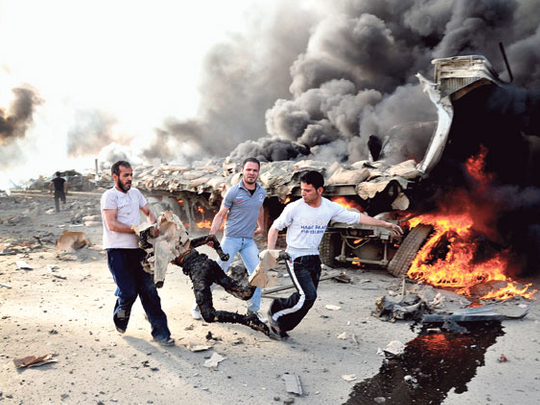
Dubai Two suicide car bombs ripped through the Syrian capital yesterday, killing more than 55 people, wounding about 400 and shaving the facade off a military intelligence building in the deadliest explosions since the country's uprising began 14 months ago, the Interior Ministry said. It said the explosives weighed more than 1,000 kg.
The carnage in Damascus shredded a ceasefire which was declared by international mediator Kofi Annan on April 12, but which has failed to halt bloodshed pitting President Bashar Al Assad's security forces against peaceful demonstrators and an array of armed insurgents.
The United States and Russia strongly condemned the bombings and called the indiscriminate killing of civilians "reprehensible." "The United States condemns in the strongest possible terms today's attacks in Damascus," State Department spokeswoman Victoria Nuland said in a statement. Russia accused unspecified foreign countries of encouraging such violence and saying Moscow would not yield to pressure to change its stance on a resolution to the conflict.
There was no claim of responsibility for the blasts. A shadowy Al Qaida-inspired group calling itself the Al Nusra Front has claimed responsibility for several past explosions, raising fears that terrorist groups are entering the fray and exploiting the chaos.
Opposition leaders said Annan's peace plan was dead, while western powers insisted it remained the best way forward. Annan himself condemned the "abhorrent" bombings and urged all parties to halt violence and protect civilians.
"The Syrian people have already suffered too much," he said in a statement. Central Damascus is under the tight control of forces loyal to Al Assad but has been struck by several bomb attacks, often targeting security installations or convoys, since the revolt against him began in March 2011.
The Syrian government blames the bombings on the terrorists it says are behind the uprising. But opposition leaders and activists routinely blame the regime for orchestrating the attacks.












